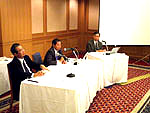How Japan Should Deal With Financial Globalization
Takahiro MIYAO (Professor and Head, Japanese Institute of Global Communications, IUJ)
| GLOCOM's Quarterly Seminar Series (Kenkyu Kyoryoku Iinkai)
|
| Date/Time: | May 28 (W) 10:00-12:00 |
| Place: | Hotel Okura, Tokyo |
| Program: |
10:00 - 10:10
Opening Addresses
Mr. Akira Miyahara & Mr. Keisuke Kamimura (GLOCOM)
10:10 - 11:30
Presentations & Discussions
Coordinator & Speaker
Prof. Kazuhito Ikeo (Keio University)
Other Speakers:
Mr. Tetsuo Seki (Nippon Steel Corporation):
Mr. Syusaku Minoda (KKR & Co.)
11:30 - 12:30
Free Discussions & Lunch
|
| Cp-sponsor: | GLOCOM, International University of Japan |
 The May meeting of GLOCOM's Quarterly Seminar Series (Kenkyu Kyoryoku Iinkai) was held at Hotel Okura in Tokyo on May 28(W), 10:00-noon, where the topic "how Japan's government, industries and corporations should respond to financial globalization" was discussed by three foremost specialists in this field, Prof. Kazuhito Ikeo (Keio University), Mr. Tetsuo Seki (Nippon Steel Corporation) and Mr. Syusaku Minoda (KKR & Co.). The May meeting of GLOCOM's Quarterly Seminar Series (Kenkyu Kyoryoku Iinkai) was held at Hotel Okura in Tokyo on May 28(W), 10:00-noon, where the topic "how Japan's government, industries and corporations should respond to financial globalization" was discussed by three foremost specialists in this field, Prof. Kazuhito Ikeo (Keio University), Mr. Tetsuo Seki (Nippon Steel Corporation) and Mr. Syusaku Minoda (KKR & Co.).
First, Prof. Ikeo gave a talk about the importance of financial services for Japan's industry and economy as a whole in the age of financial globalization, where the relative position of the financial and capital markets in Tokyo seems to be declining relative to not only New York and London, but also Hong Kong and Singapore these days. One of the problems in Japan, according to Prof. Ikeo, is the lack of commitment on the part of the government and the business circle in supporting Japan's financial power to be competitive globally and in fostering the positive side of financial services to help other industries perform better, while containing their negative side such as rent-seeking behavior by setting up proper rules and systems in the financial service industry.
Next, Mr. Seki presented an overview of the steel industry as a representative of the Japanese industry as a whole, facing a rapidly increasing demand from China and other emerging economies as well as a drastic restructuring movement on the supply side including M&As in global scale. Then he emphasized the fact that the Japanese industry could not compete and grow any further without the strong support of appropriate financial services, which should perform important functions in supplying ample funds and risk money for industrial growth in the future. In particular, Japanese financial institutions, in close contact with representative companies and thrifty households in Japan, should be able to help Japanese corporations become global "players" rather than just "suppliers" by setting up global business networks through M&As, which require a huge amount of money, according to Mr. Seki.
Finally, Mr. Minoda made the same points as the previous speakers by pointing out the crucial importance of "partnership," or "win-win relationship" between industry and finance in determining the strength of business, industry and the economy as a whole. In fact, Japan did achieve exactly that between corporations and banks domestically in the postwar period, but failed to develop an efficient capital market as well as a global business perspective to compete over an exploding market in emerging economies. It is imperative that the partnership between industry and finance be reestablished, not domestically but globally this time, in terms of money, information, human resources, etc. through various channels, arrangements and markets.
After the presentations, Prof. Ikeo led the discussion session by asking such questions as how Japanese financial institutions can build global business networks, and how Japanese human resources can be better trained and made more fluid so that human networks may be expanded globally. There appeared to be no good answers to these difficult questions, as the dominance of foreign financial institutions to support international business is so obvious, and the reluctance of Japanese business people to directly interact with "foreigners" is so prevalent even today. However, everyone clearly agreed on the need to strengthen the financial and capital markets as well as the financial industry in Japan from the global point of view.
This report is adopted from the following blog (with its Japanese translation):
http://glocom.blog59.fc2.com/blog-date-20080528.html
|





